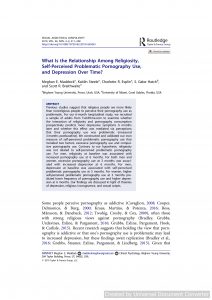Mental Health
What Is the Relationship Among Religiosity, Self-Perceived Problematic Pornography Use, and Depression Over Time?
 Full Article Name: What Is the Relationship Among Religiosity, Self-Perceived Problematic Pornography Use, and Depression Over Time?
Full Article Name: What Is the Relationship Among Religiosity, Self-Perceived Problematic Pornography Use, and Depression Over Time?
Open Access: No
Abstract
Previous studies suggest that religious people are more likely than nonreligious people to perceive their pornography use as problematic. For our 6-month longitudinal study, we recruited a sample of adults from TurkPrime.com to examine whether the interaction of religiosity and pornography consumption prospectively predicts more depressive symptoms 6 months later and whether this effect was mediated via perceptions that their pornography use was problematic (measured 3 months postbaseline). We constructed and validated our own measure of self-perceived problematic pornography use that included two factors: excessive pornography use and compulsive pornography use. Contrary to our hypothesis, religiosity was not related to self-perceived problematic pornography use. For men, religiosity at baseline was associated with increased pornography use at 6 months. For both men and women, excessive pornography use at 3 months was associated with increased depression at 6 months. For men, depression at baseline was associated with self-perceived problematic pornography use at 3 months. For women, higher self-perceived problematic pornography use at 3 months predicted lower frequency of pornography use and higher depression at 6 months. Our findings are discussed in light of theories of depression, religious incongruence, and sexual scripts.
Citation
Maddock, M. E., Steele, K., Esplin, C. R., Hatch, S. G., & Braithwaite, S. R. (2019). What is the relationship among religiosity, self-perceived problematic pornography use, and depression over time? Sexual Addiction & Compulsivity, 26(3-4), 211–238. https://doi.org/10.1080/10720162.2019.1645061
